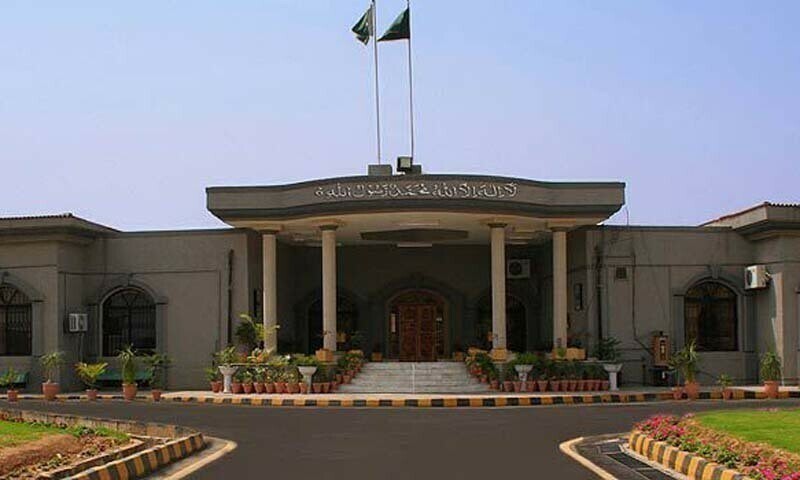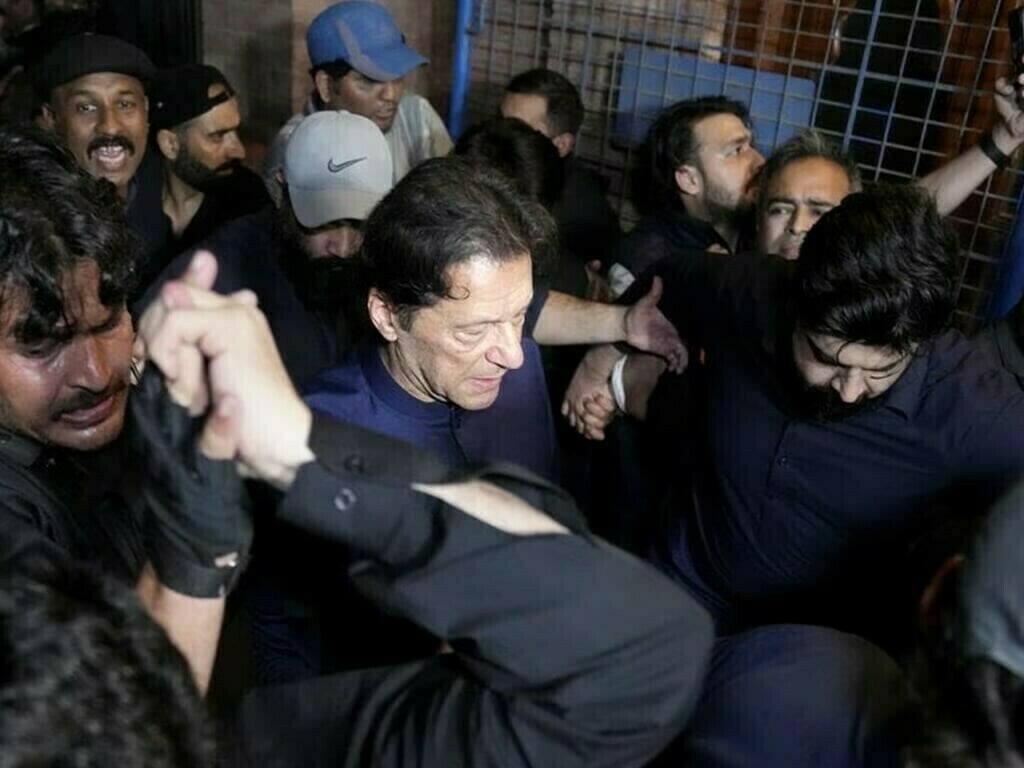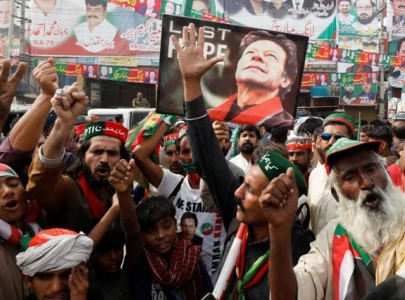ghazi52
PDF THINK TANK: ANALYST

- Joined
- Mar 21, 2007
- Messages
- 101,794
- Reaction score
- 106
- Country
- Location
.,..
August 4, 2023
The Islamabad High Court (IHC) on Friday set aside a trial court verdict that had declared the Toshakhana reference filed by the Election Commission of Pakistan (ECP) against the PTI chairman as maintainable for criminal proceedings.
IHC Chief Justice Aamer Farooq ordered the trial court to decide the matter again after re-hearing the case.
He also rejected the PTI chief’s appeal to transfer the case to another court and issued a notice for next week on a petition to restore Imran Khan’s right of defence in the Toshakhana trial.
“The matter is remanded to the trial court for decision afresh,” the IHC said in a detailed order, a copy of which is available with Dawn.com, noting that the IHC was informed that the case was fixed for final arguments in the trial court today.
“The petitioner shall ensure addressing of arguments positively on the issue when the matter is fixed by the court for final arguments. The trial court shall address the issues raised in the referred petitions while deciding the matter,” the order reads.
It also directed the Federal Investigation Agency to inquire into the matter of certain alleged posts on the session judge’s Facebook account, involve everyone concerned in the matter and furnish a report to the IHC deputy registrar within a fortnight.
Earlier in the morning today, the Supreme Court dismissed Imran’s plea against trial proceedings pertaining to the Toshakhana complaint after he withdrew his petition.
Imran was indicted in the Toshakhana case on May 10. However, Justice Farooq had stayed the proceeding and directed Additional District and Sessions Judge (ADSJ) Humayun Dilawar to re-examine the matter in seven days, keeping in view eight legal questions he framed to decide the maintainability of the Toshakhana reference.
The questions had included whether the complaint was filed on behalf of the ECP by a duly authorised person, whether the ECP’s decision of Oct 21, 2022, was a valid authorisation to any officer of ECP to file a complaint, and whether the question of authorisation was a question of fact and evidence and could be ratified subsequently during the course of proceedings.
However, when the sessions judge had re-examined the matter, Imran’s counsel Khawaja Haris did not appear before the court to argue the case in three consecutive hearings.
Finally, on July 9, ADSJ Dilawar while ruling that the reference was maintainable, revived the stalled proceedings and summoned the witnesses for testimony.
A session court had last month declared that the ECP reference against the PTI chief was maintainable. The decision was subsequently challenged in the IHC.
On Thursday, the IHC had reserved its verdict on the set of petitions filed by PTI Chairman Imran Khan, including the application against the maintainability of the complaint seeking criminal proceedings against him on the charge of hiding Toshakhana gifts.
Around 3pm, ADSJ Dilawar asked Imran’s counsel Gohar Khan about the IHC’s developments and was briefed on the high court’s verdict for a fresh decision.
The judge said the ECP lawyer had already given his final arguments and summoned the PTI chief on Saturday (tomorrow), ordering his lawyers to present their final arguments as well on the maintainability of the case.
“The Toshakhana case has entered the final stage in the sessions court. According to the records of the hearings, the trial is in its final stages. The PTI chairman preferred to file petitions in the IHC at the final stage of the trial,” the judge said.
He warned the verdict would be reserved and announced if Imran and his lawyers did not appear at 8:30am on Saturday to give their arguments.
The case alleges that Imran had “deliberately concealed” details of the gifts he retained from the Toshaskhana — a repository where presents handed to government officials from foreign officials are kept — during his time as the prime minister and proceeds from their reported sales.
Imran has faced a number of legal issues over his retention of gifts. The issue also led to his disqualification by the ECP.
On Oct 21, 2022, the ECP concluded that the former premier had indeed made “false statements and incorrect declarations” regarding the gifts.
The Toshakhana is a department under the Cabinet Division that stores gifts given to rulers and government officials by heads of other governments and foreign dignitaries. According to Toshakhana rules, gifts/presents and other such materials received by persons to whom these rules apply shall be reported to the Cabinet Division.
The watchdog’s order had said Imran stood disqualified under Article 63(1)(p) of the Constitution.
Subsequently, the ECP had approached the Islamabad sessions court with a copy of the complaint, seeking proceedings against Imran under criminal law for allegedly misleading officials about the gifts he received from foreign dignitaries during his tenure as the prime minister.

Toshakhana case
IHC sets aside trial court verdict declaring PTI chief’s Toshakhana reference ‘maintainable’
Umer BurneyAugust 4, 2023
The Islamabad High Court (IHC) on Friday set aside a trial court verdict that had declared the Toshakhana reference filed by the Election Commission of Pakistan (ECP) against the PTI chairman as maintainable for criminal proceedings.
IHC Chief Justice Aamer Farooq ordered the trial court to decide the matter again after re-hearing the case.
He also rejected the PTI chief’s appeal to transfer the case to another court and issued a notice for next week on a petition to restore Imran Khan’s right of defence in the Toshakhana trial.
“The matter is remanded to the trial court for decision afresh,” the IHC said in a detailed order, a copy of which is available with Dawn.com, noting that the IHC was informed that the case was fixed for final arguments in the trial court today.
“The petitioner shall ensure addressing of arguments positively on the issue when the matter is fixed by the court for final arguments. The trial court shall address the issues raised in the referred petitions while deciding the matter,” the order reads.
It also directed the Federal Investigation Agency to inquire into the matter of certain alleged posts on the session judge’s Facebook account, involve everyone concerned in the matter and furnish a report to the IHC deputy registrar within a fortnight.
Earlier in the morning today, the Supreme Court dismissed Imran’s plea against trial proceedings pertaining to the Toshakhana complaint after he withdrew his petition.
Imran was indicted in the Toshakhana case on May 10. However, Justice Farooq had stayed the proceeding and directed Additional District and Sessions Judge (ADSJ) Humayun Dilawar to re-examine the matter in seven days, keeping in view eight legal questions he framed to decide the maintainability of the Toshakhana reference.
The questions had included whether the complaint was filed on behalf of the ECP by a duly authorised person, whether the ECP’s decision of Oct 21, 2022, was a valid authorisation to any officer of ECP to file a complaint, and whether the question of authorisation was a question of fact and evidence and could be ratified subsequently during the course of proceedings.
However, when the sessions judge had re-examined the matter, Imran’s counsel Khawaja Haris did not appear before the court to argue the case in three consecutive hearings.
Finally, on July 9, ADSJ Dilawar while ruling that the reference was maintainable, revived the stalled proceedings and summoned the witnesses for testimony.
A session court had last month declared that the ECP reference against the PTI chief was maintainable. The decision was subsequently challenged in the IHC.
On Thursday, the IHC had reserved its verdict on the set of petitions filed by PTI Chairman Imran Khan, including the application against the maintainability of the complaint seeking criminal proceedings against him on the charge of hiding Toshakhana gifts.
Trial court summons PTI chief tomorrow for final arguments
Meanwhile, the session court also resumed its proceedings in the case today, during which ECP counsel Amjad Pervaiz delivered his final arguments.Around 3pm, ADSJ Dilawar asked Imran’s counsel Gohar Khan about the IHC’s developments and was briefed on the high court’s verdict for a fresh decision.
The judge said the ECP lawyer had already given his final arguments and summoned the PTI chief on Saturday (tomorrow), ordering his lawyers to present their final arguments as well on the maintainability of the case.
“The Toshakhana case has entered the final stage in the sessions court. According to the records of the hearings, the trial is in its final stages. The PTI chairman preferred to file petitions in the IHC at the final stage of the trial,” the judge said.
He warned the verdict would be reserved and announced if Imran and his lawyers did not appear at 8:30am on Saturday to give their arguments.
Toshakhana case
The case, filed by ruling party lawmakers, is based on a criminal complaint filed by the ECP.The case alleges that Imran had “deliberately concealed” details of the gifts he retained from the Toshaskhana — a repository where presents handed to government officials from foreign officials are kept — during his time as the prime minister and proceeds from their reported sales.
Imran has faced a number of legal issues over his retention of gifts. The issue also led to his disqualification by the ECP.
On Oct 21, 2022, the ECP concluded that the former premier had indeed made “false statements and incorrect declarations” regarding the gifts.
The Toshakhana is a department under the Cabinet Division that stores gifts given to rulers and government officials by heads of other governments and foreign dignitaries. According to Toshakhana rules, gifts/presents and other such materials received by persons to whom these rules apply shall be reported to the Cabinet Division.
The watchdog’s order had said Imran stood disqualified under Article 63(1)(p) of the Constitution.
Subsequently, the ECP had approached the Islamabad sessions court with a copy of the complaint, seeking proceedings against Imran under criminal law for allegedly misleading officials about the gifts he received from foreign dignitaries during his tenure as the prime minister.

IHC sets aside trial court verdict declaring PTI chief’s Toshakhana reference ‘maintainable’
Says the matter is remanded to the trial court for decision "afresh"; ADSJ Humayun Dilawar summons Imran Khan and his lawyers tomorrow.
www.dawn.com



